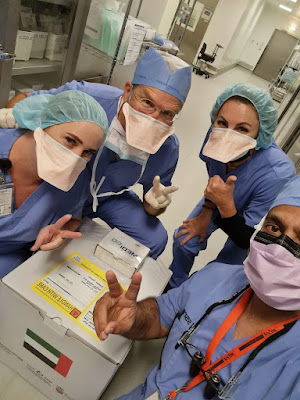Israel's Organ Transplantation Law grants some priority on waiting lists for transplants to candidates who are first-degree relatives of deceased organ donors (i.e. whose family has given permission for someone's deceased organ donation) or who previously registered as organ donors themselves. (There's also a tiny priority for relatives of people who signed organ donor cards...) Here are two papers that looks at the effect of those priorities on kidney and liver transplants, and how they interact with other priorities on waiting lists for Israeli organs.
The first paper, on kidneys, concludes that the priorities are effective in reducing waiting time to transplant, and suggests that perhaps these priorities should not be so large compared to other existing priorities (e.g. for time on dialysis), or for priorities that could be established, e.g. for highly sensitized patients (who get high priority in the U.S., for example.)
Mor, Eytan, Meitar Bloom, Ronen Ghinea, Roi Anteby, Ronit Pasvolsky-Gutman, Ron Loewenthal, Ido Nachmani, and Tammy Hod. "The Impact of the Donor Card Holder Prioritization Program on Kidney Allocation in Israel." Transplantation (2024): 10-1097.
Abstract
Background: Since 2014, as part of a priority program within the Israeli Transplant Law, additional points were given to waitlisted candidates with donor cards. We assessed the impact on deceased donor kidney allocation.
Methods: This study enrolled all patients older than 18 y who underwent deceased donor kidney transplantation (January 2016–December 2019). Data were obtained from the National HLA Tissue Laboratory registry at the Sheba Medical Center. Patients were grouped by donor card status (ADI group) (not signed, 0 points; relative signed, 0.1 points; patient signed, 2 points; and relative donated, 9 points). The primary outcome was waiting time until kidney transplantation with and without the additional score.
Results: Four hundred forty-four patients underwent kidney transplantation during the study period: 281 (63%) were donor card holders (DCH) and 163 (37%) were not DCH. DCH with extra points waited 68.0 (±47.0) mo on average, compared with 94.6 (±47.3) mo for not DCH (P < 0.001). Donor card signers had a shorter time until transplant in a multivariable model. Without extra points, 145 recipients (32.6%) would have missed organs allocated to higher-scored candidates. Allocation changes occurred in 1 patient because of an additional 0.1 points, in 103 candidates because of an additional 2 points, and in 41 candidates because of an additional 9 points.
Conclusions: Additional DCH scores improved allocation and reduced waiting time for donor card signers and those with donating relatives. To enhance fairness, consideration should be given to reducing the score weight of this social criterion and raising scores for other factors, especially dialysis duration.
##########
There are many fewer liver transplants than kidney transplants, and the effect of priority is less clear:
Ashkenazi, Tamar, Avraham Stoler, and Eytan Mor. "The effect of priority given to donor card holders on the allocation of livers for transplant—evidence from 7 years of the Israeli priority program." Transplantation 106, no. 2 (2022): 299-307.
Abstract
Background. The Israeli Transplant Law grants priority in organ allocation to patients signing a donor card. Liver transplant candidates get additional 2 points on their Model for End Stage Liver Disease score for signing a donor card, 0.1 points for a relative holding a card, and 5 points if a relative donated an organ. We studied the effect of the priority program on waiting list mortality and allocation changes due to priority.
Methods. Using Israeli Transplant data of 531 adult liver transplant candidates with chronic liver disease listed between 2012 and 2018 we compared waitlist mortality and transplant rate of candidates with and without priority. Then we analyzed liver allocations resulting from additional priority points and followed outcome of patients who were skipped in line.
Results. Of the 519 candidates, 294 did not sign a donor card, 82 signed, 140 had a relative sign, and for 3, a relative donated an organ. The rates of waitlist mortality in these 4 groups were 22.4%, 0%, 21.4%, and 0%, respectively, and the transplant rates were 50%, 59.8%, 49.3%, and 100%, respectively. Of the 30 patients who were skipped because of priority, 24 subsequently underwent transplant, 2 are on the waiting list, and 4 died within 0.75, 1.75, 7, and 17 mo.
Conclusions. The 2 points added to the Model for End Stage Liver Disease score were associated with lower waitlist mortality and higher transplant rate for candidates signing a donor card without significantly affecting access to transplant during allocation. Further research and consideration of optimal policy when granting priority for candidates signing a donor card should continue.
###########
Earlier:
Stoler, Avraham, Judd B. Kessler, Tamar Ashkenazi, Alvin E. Roth, Jacob Lavee, “Incentivizing Authorization for Deceased Organ Donation with Organ Allocation Priority: the First Five Years,” American Journal of Transplantation, Volume 16, Issue 9, September 2016, 2639–2645.
Stoler, Avraham, Judd B. Kessler, Tamar Ashkenazi, Alvin E. Roth, Jacob Lavee, “Incentivizing Organ Donor Registrations with Organ Allocation Priority,”, Health Economics, April 2016 Volume: 26 Issue: 4 Pages: 500-510 APR 2017











